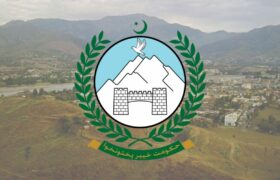Pakistan faces a myriad of environmental security challenges that compound worries about its economic economic stability. These challenges encompass issues such as water scarcity, air pollution, climate change, and environmental degradation. The country is on its way becoming the most water-stressed country in the region by the year 2040. This water crisis can negatively impact agricultural production, which contributes around 23% of Pakistan’s Gross Domestic Product (GDP) and creates job opportunities for around 42% of the population. The water crisis can also lead to increased healthcare costs, reduced productivity, and increased poverty.
Along with the issue of water scarcity, Air pollution has also emerged as a huge problem in Pakistan affecting health as well as transport and mobility. This can lead to increased healthcare costs and reduced productivity, which can negatively impact the economy.
Pakistan is among the top ten most vulnerable countries in the world to the impacts of climate change. Climate change can lead to floods, heat waves, drought, crop losses, and diseases, which can negatively impact the economy. Climate change can also lead to climate-induced conflict over resources, such as water, that have become scarce due to climate change impacts.
Environmental degradation, including soil erosion, deforestation, and unbridled and unplanned urbanization, can also negatively impact the economy by reducing productivity and competitiveness. Environmental degradation can also lead to increased poverty, particularly among vulnerable populations. It is estimated that environmental degradation costs Pakistan about 6% of its GDP per year.
The environmental security challenges confronting Pakistan present a pressing national emergency that warrants immediate attention and action, akin to a wartime effort. These challenges, if left unaddressed, have the potential to compound the country’s existing multitude of issues, including economic strains. They also carry the risk of igniting conflicts rooted in climate-related resource scarcity, particularly concerning vital resources like water, which have grown scarcer due to the impacts of climate change.
It is crucial to recognize that environmental issues and challenges are intricately intertwined with larger economic concerns faced by Pakistan. The environment exerts a profound and lasting impact on national expenditure. Pakistan’s environmental and climate change crisis isintricately linked with the country’s energy security. The environmental challenges Pakistan faces significantly affect its energy sector, underscoring the urgency of addressing these issues comprehensively. Here are some of the ways through which these challenges are impacting Pakistan’s energy sector:
Pakistan is grappling with a significant energy deficit, resulting in inadequate energy supply to meet the needs of its population. This energy shortfall has led to widespread power outages, affecting various sectors of the economy and causing inconvenience to the general populace. This is exacerbated by the flood impacts on the government’s resources and on Pakistan’s physical energy infrastructure. Also, increased temperatures in cities have generated an increased demand in energy and cooling appliances like air conditioners and chillers. These are contributing towards increased energy demand further creating burden on existing energy infrastructure where both production and distribution of electricity in adequate amount is a challenge.
When demand of electricity increased, it creates a situation where despite having indigenous rivers, natural gas, renewable, and coal resources, Pakistan has become more dependent on imported oil, gas, and—recently—coal resources due to poor planning and poor policymaking cycles over the decades. This dependency makes Pakistan increasingly vulnerable to trade disruptions and price fluctuations. Recent uproar over electricity bills is the most vivid example of this inter-lined phenomenon.
Anti-environmental energy policies are further amplifying environmental challenges to Pakistan and the South Asia region as a whole. Pakistan established coal-based power plants in large number in areas where air pollution was minimum previously like Sahiwal. Such projects are not only a challenge for environment but also make no sense from economic viability point of view as they run on imported coal and are located thousands of miles away from Pakistan’s main port city of Karachi. As mentioned earlier, affordability of energy is a major challenge in Pakistan, where many people cannot afford to pay for electricity. Expensive energy created through imported fossil fuel is not only destroying our environment but also weakening our social fabric. This situation can lead to reduced access to energy, which can negatively impact economic growth and development.
Pakistan has significant potential for renewable energy, including solar, wind, and hydropower. However, the country has not yet fully tapped into this potential, and the energy mix is still dominated by fossil fuels. Many countries around the world have moved on these energy resources to protect their environment and secure their social bond.
To address these environmental security challenges, Pakistan needs to implement long term policies and measures to improve environmental sustainability, such as reducing air and water pollution, addressing climate change, and promoting sustainable agriculture. By addressing these environmental challenges, Pakistan can achieve sustainable economic growth and development.
Pakistan must invest in climate resilience to protect the economy from shocks and secure more sustainable and inclusive growth. Iinterventions to improve air quality and reduce greenhouse gas emissions can also have co-benefits for both adaptation and mitigation.
The state also needs to address root causes of environmental degradation, such as unsustainable land use practices and deforestation, through proper mitigation and environmental legislation. And also, invest in renewable energy to reduce dependency on imported resources and improve energy security. Improving energy efficiency can reduce energy demand and improve affordability.
The environmental concerns, such as air pollution and water scarcity, needs to be addressed through proper mitigation and environmental legislation. Moreover, improving governance and fiscal management of the energy sector can ensure reliable and affordable energy access for all.




